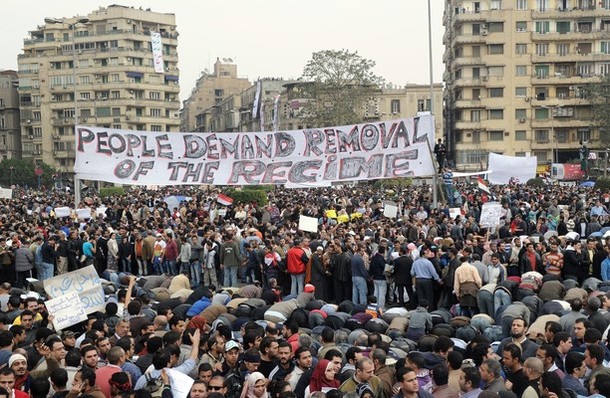
The last few weeks have proven the old adage that one spark can kindle a great fire. Starting in Tunisia, where a twenty-six year-old lit himself on fire to protest rising prices and unemployment in the face of a callous and corrupt regime, the winds of discontent have spread the flame of protest across the Arab world. Dozens of self-immolations have taken place in Egypt, Morocco, Mauritania, Saudi Arabia, and Algeria, rattling autocratic dictators throughout the region.
The sacrifices have already overturned the Tunisian government and now stand to destabilize the Egyptian regime, as hundreds of thousands assembled in Tahrir square on Tuesday to give voice to years of pent-up frustration.
The turn of events suggest it is only a matter of time before the Egyptian president is forced to concede power. The facts speak for themselves: Hosni Mubarak is an eighty-two year autocrat entering his thirtieth year in power in a country where the median age is twenty-four. More than half of Egypt’s eighty million residents are under the age of twenty-six and have never witnessed a free or fair election. Factor in the reality that the country is suffering from one of the highest youth unemployment rates in the world, that prices for basic commodities like bread have nearly quadrupled, that little to no political recourse has been available for decades, and one starts to wonder why it took the Egyptian people this long to rise up.
Of course, one reason is that the Egyptian government is the second largest recipient of U.S. foreign assistance, receiving an annual average of close to $2 billion since 1979. Over 80 percent of that aid is in the form of military assistance, putting America in the unfortunate position of indirectly supporting Mubarak’s ongoing efforts to threaten protesters with force, if not outright subsidizing his hold on power for the last three decades.
The ‘better the devil you know’ position of American foreign policy has turned a blind eye to the undemocratic regime for decades, with Secretary of State Hillary Clinton initially declaring Mubarak’s regime "stable" last week, despite the signs showing anything but. The US administration has since withdrawn its support for Mubarak, much like the French apologized for their initial support of ousted Tunisian President Ben-Ali.
And yet, while American diplomats have wavered between supporting immediate democratic reform and preserving the status quo, American technologies of YouTube, Wikipedia, and Facebook have equipped the people with tools actually capable of holding their leaders accountable.
As throughout most of the Arab world, radio and newspapers are firmly state-controlled; outspoken journalists are routinely imprisoned; and criticism of the ruling party is all but quashed. The last refuge of free speech has, until now, been found online. These back-alleys have protected citizens with a level of virtual anonymity and a space to vent their frustration. The recent advent of social media tools like Facebook and Twitter have provided further opportunities for expressing dissent.
Indeed, the last two years have given rise to an unprecedented wave of online activism in the country and region at large – the 2009 revolts in Iran, the recent overthrow of the Tunisian government, and now the Egyptian uprisings have all been organized from computers. More than 90,000 people signed up for the first Cairo protest last week, on just one Facebook page. The movement’s momentum has been stoked via Twitter, with tech-savvy Egyptians uploading news, photos and videos of the protests in real-time. Even mainstream journalists from outside of Egypt rely on the steady flow of online information to drive their coverage of the still-unfolding situation.
There is no doubt that Web 2.0 technologies are being used to shape a new era in Egyptian politics, with the revelation not at all lost on the Mubarak regime.
Not surprisingly, Twitter and Facebook were immediately blocked by the government. But time has shown that nearly all attempts to obstruct the Internet have largely failed; for every government-concocted filter, there exist hundreds of online proxies to out-maneuver it. So the government took extreme measures by cutting off the entire Internet last Thursday, ahead of the then-largest day of protests. It was a clear sign that Mubarak is terrified of the empowering ability of social media to mobilize his downfall. It was also a desperate, last-ditch effort to cling to power.
Today, the Internet was switched back on. And yet, like most of Mubarak’s recent decisions, it is a matter of too little, too late. Shutting off the communications grid certainly seemed like a good idea, but social media – for all its value – was not the driving force for the current protests.
The seeds of unrest were sown years ago, compounded with each passing year; Facebook and Twitter simply provided a critical tipping point. Now, instead of mobilizing their actions online, Egyptians are relying on the most effective means of communication: word-of-mouth. Instead of sitting idly behind computers, the angry masses are courageously ignoring the curfews and boldly demonstrating in the streets.
The movement is now self-aware, with the youth awake to the fresh possibility that their voice does in fact hold political sway. The psychological barrier of fear has fallen, and Egyptians need not look further than Tunisia to see that a people united can bring about great change. At this point there is little that Mubarak can do to quell public anger, save fully comply with demands that he step down.
In the following weeks, and for the first time in decades, it will be up to the Egyptian people to determine their government. Mubarak might be able to silence their tweets but the roar that remains is heard loud and clear.
Andrew Kessinger interned with the New Atlanticist during the Summer 2009 semester. He is a recent graduate of Columbia University’s School of International and Public Affairs (SIPA). Photo credit: Getty Images.
Image: tahrirsq.jpg
